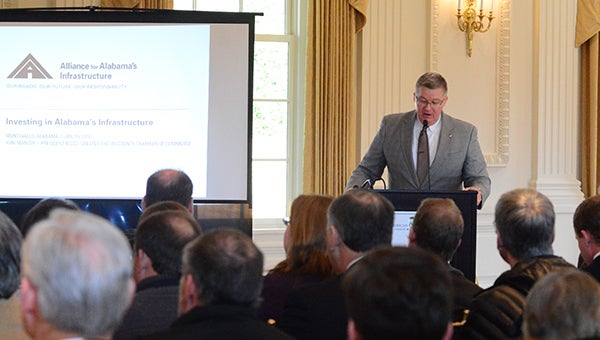County leaders discuss current and future state of transportation
Published 5:25 pm Tuesday, January 19, 2016

Greater Shelby County Chamber Presidents and CEO Kirk Mancer speaks at the Regional Transportation Infrastructure Hearing on Tuesday, Jan. 19 at American Village in Montevallo. (Reporter Photo/Graham Brooks)
By GRAHAM BROOKS / Staff Writer
MONTEVALLO–The American Village played host to the second of five regional meetings discussing the future of Alabama’s roads, bridges, projects and other infrastructure needs on Tuesday, Jan. 19.
In addition to the meeting in Montevallo, members of the Alabama Legislature’s Joint Transportation Committee will travel to Tuscaloosa, Huntsville, Mobile and Dothan in January.
The Alliance for Alabama’s Infrastructure hosted the meeting on Jan. 19, in partnership with the Business Council of Alabama and the Greater Shelby County Chamber of Commerce.
Several Shelby County leaders including County Manager Alex Dudchock, County Engineer Randy Cole and Shelby County Schools Deputy Superintendent Tom Ferguson all gave insight and statistics on ways to help improve roadways and transportation in the state.
One of the main topics of discussion revolved around the need for funding.
As technology has advanced and cars have become more fuel-efficient in the last decade, it has resulted in a decrease in funds the state receives from gas taxes.
Cole said the funding has to be distributed carefully when choosing which projects to pursue.
“We have earmarked gas tax funds in Shelby County for resurfacing,” said Cole. “That comes to about $2.5 million a year we spend on our resurfacing. Now the problem with that is, is that my staff brings to me a project every year and they want to do $5-6 million. We know every year, when we resurface someone and skip others, we get complaints from the public saying ‘Well my road had to be on the list?’ We have to make very difficult decisions about which roads to have to put off.”
The Shelby County Commission is responsible for a total of “1,005 miles of roads, with 894 miles of that being paved and 111 miles being dirt,” according to Cole.
Another important aspect discussed was the topic of transportation when it comes to education and getting students where they need to be safely.
Ferguson said he understands when people complain about congestion on certain Shelby County roadways and want solutions, but safety should not be lost in that discussion.
“For 16 years I have been supervising the operations department and transportation is one of those,” said Ferguson. “We travel 12,900 miles a day, which is about 2,000,300 miles each year. We transport 10,600 students a day and we have 286 buses. It’s very important that we get children from point A to point B safely. I hear words of congestion, concerns about infrastructure and we drive up and down every one of those roads. When you talk about congestion, all of our buses are on those roads. We are up and down 280, 261, Valleydale, 31 and it all affects us. Finding the appropriate funds is important and I’m sure that’s what we’re all about but hopefully one of the things we can hang our hats on is getting children where they need to be safely. That’s what we’re all about.”
For more information on the AAI, visit Alabamaroads.org.









